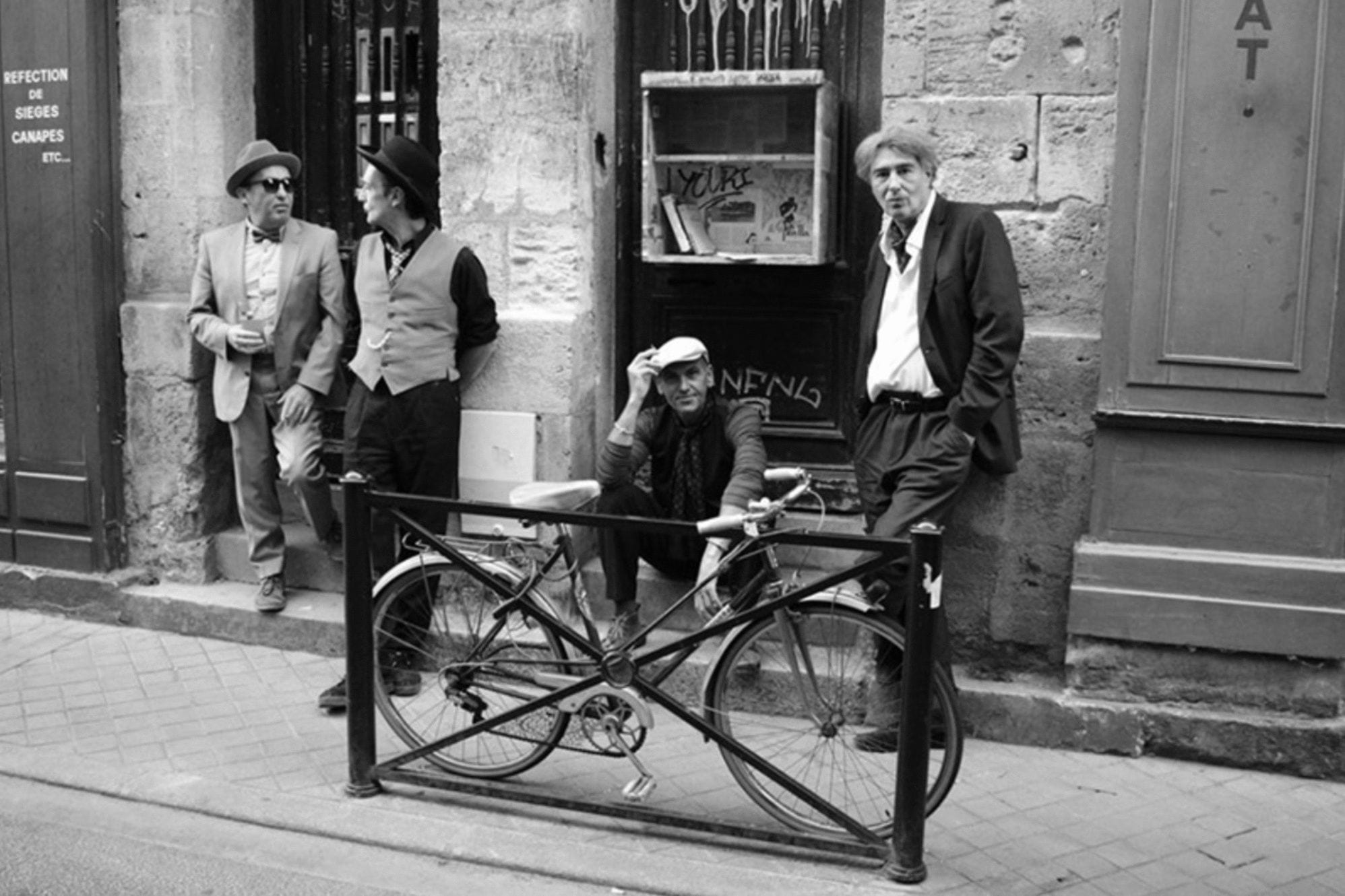
Near the end of the 1980s, Pat Fish (the Jazz Butcher) had a quartet of fine albums and no band. He also suddenly found himself without a label. Despite some hastily assembled tours and a version of the group that was less than full, Fish soon became the object of the Creation label’s desire. There was an American record company knocking too. With lots of cash. The yank deal never materialized, but Creation lingered in the doorway, ultimately providing Fish shelter from the storm.
Armed with a new gang of conspirators, the Jazz Butcher embarked on the first of four albums (all collected in this new box), Fishcoteque (1988). Former guitar tech Kizzy O’ Callaghan became the singer’s primary collaborator with two Daves (Goulding and Morgan, both of the Weather Prophets) filling out the drum ‘n’ bass chairs nicely. Saxophonist Alex Green squonks and honks nicely throughout.
There’s nothing tentative about those sessions, despite some early fussing with the lineup and the outfit’s embryonic standing. The rhythm section cracks and whacks with mind-shattering accuracy throughout, with soulful vocal inflections and funky guitar figures carrying material such as “Out of Touch” and “Chickentown” across the victory line.
The latter tune suggests that the Jazz Butcher’s music could have been used to raze disused apartment complexes from Manchester to Chicago just by plugging in and giving us a good ol’ D-A-E. But it’s not just about the power, about being loud. There’s also some ace writing: “Next Move Sideways” and “Get It Wrong” and “Looking For Lot 49”, one tune which does not employ the two Daves rhythm section but instead uses Dave Sulyeman on bass and Blair MacDonald on drums. It cooks with rarified intensity. If there’s a down moment here, it’s the confusing Blondie-cum-Clash-cum-rap number “The Best Way”. It becomes a muddle faster than a Public Image Limited B-side. Though, even in that, it retains some charm.
As good as that record was, the following year’s Big Planet, Scarey Planet is more confident, sometimes angrier and arguably one of the heaviest records never associated with heavy music at all. “Line of Death”, “Burglar of Love”, and “New Invention” aren’t entirely out of tune with Bowie’s sonic assaults as a member of Tin Machine. Still, there’s plenty of melodicism (“Hysteria”), the beautifully stomping psych and soul exploration, “Bicycle Kid” and “Bad Dream Lover”.
From there, the set takes a weird turn. Having been forced to leave the band due to health concerns temporarily, O’ Callaghan was absent until sessions for 1990’s Cult of the Basement began. Having undergone surgery for a brain tumor, the guitarist’s health never returned to a normal state, and he was only able to play on one song, “Excellent”. The rest of the record is awash in all manners of weirdness, inspired by a series of records such as Big Star’s Third, Bob Dylan’s Oh Mercy and Skip Spence’s Oar. If ever there had been high commercial hopes for Fish and friends, they were pretty well demolished by this one.
Sampling, loud, boomy drums and lyrics that are scattered across sonic landscapes like lysergic bread crumbs dominate. It’s not that there isn’t stuff to recommend (“Turtle Bait” smokes with aplomb; “The Onion Field” is creepy and cool) it’s that the turmoil and weirdness of the times reveal themselves in the notes and becoming witness to all that is not for the faint of heart. If it’s not the most palatable moment in the oeuvre, it’s arguably the most intriguing and one that will haunt you from first listen to four hundredths.
By the time touring had concluded for Cult, Fish once again found himself on his own. There was no band to band together, and all manner of personal strife conspired against his spirits, including, no doubt, the 1990 death of O’ Callaghan. Still, the singer pulled himself together and made an idiosyncratic breakup record with various and sundry friends from across the years.
If Cult of the Basement was the sound of the Bonzo Dog Doo-Dah Band shopping in a supermarket filled with hallucinogenic treats, Condition Blue is perhaps the most straightforward and radio-ready of the lot here. The pain behind “Girls Say Yes” is palpable, haunting guitar figures tugging at our heartstrings as does our vocalist’s lovely, first-rate performance. Any stray weirdness leftover from previous affairs has been tidily harnessed (“Our Friends the Filth”), and when the group throws caution to the wind (“She’s a Yo-Yo”) it does so blazingly, unapologetically.
“She’s a Yo-Yo” isn’t the final statement on this set, but it feels like it should be as it’s a wild, wonderful snapshot of an artist and his friends who’d fought tremendous odds. There’s pain, yes, but there’s deep, deep reward too.
This would be the last we’d hear from the Jazz Butcher just then. Two years down the road, a new album and a new name, the Jazz Butcher Conspiracy, would take us on another daring turn.

